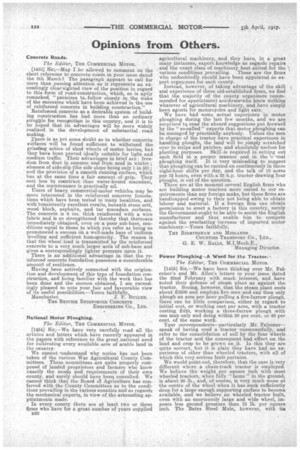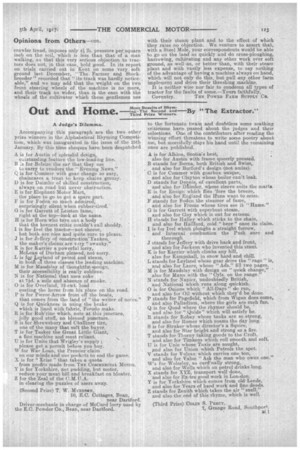Opinions from Others.
Page 16

Page 17

If you've noticed an error in this article please click here to report it so we can fix it.
Concrete Roads.
The Editor, TEE COMMERCIAL MOTOR.
[1453] Sir,—May I be allowed to eminent on the short reference to concrete roads in your issue dated the 8th March? The paNa,graph appears to call for more than passing attention as it represents an exceedingly clear-sighted view of the position in regard to this form of road-construction, which, as is aptly remarked, "promises to. follow closely in. the wake of the successes which-have been achieved in the-use of reinforced concrete in building construction."
Reinforced concrete as a desirable system of building construction has had more than an ordinary struggle for recognition in this country, and it is to be hoped that its advantages will be more widely realized in the development of substantial road making.
:fhere is as yet some doubt as to whether concrete surfaces will be found sufficient to withstand the grinding action of shod wheels of -motor lorries, but they lave been proved ideally suitable for light and medium traffic. Their advantages in brief are : freedom from dust in summer and from mud in winter ; absence of sideslip (the side slope being only 1 in 50); and the provision of a smooth running surface, which has at the same time a fair amount of grip. They cost less to construct than water-bound macadam, and the maintenance is practically nil. Users of heavy commercial-motor vehicles may be more interested in the reinforced concrete fp-initiations which have been tested in many localities, and with consistently excellent results, beneath stone sett, wood block, asphalte, and tar macadam surfaces. The concrete is 6 ins, thick reinforced with a wire fabric and is so strengthened thereby that theretare immediately obtained, even on a poor sub-base., conditions equal to those to which you refer as being so pronounced a success on a well-made base of uniform levelling and sufficient homogeneity._ The reason is that the wheel load is transmitted by the reinforced concrete to a very much larger area of cub-base and gives a correspondingly lighter pressure upon it.
There is an additional advantage in that the reinforced concrete foundation possesses a considerable amount of resilience.
Having been actively connected with the origination and development of this type of foundation construction, and being familiar with the work that has been done and the success obtained, I am exceedingly pleased to note your fair and favourable view of its useful possibilities.—Yours faithfully
F. Buer.EN. Manchester.
THE BRITISH REINFORCED CONCRETE ENGINEERING CO., LTD. National Motor Ploughing.
The Editor, THE COMMERCIAL MOTOR.
[1454] Sir,—We have very carefully read all the articles and letters which have recently appeared in the papers with reference to the great national need for cultivating every available acre of arable land in the country.
We cannot !understand why notice has not been taken of the various War Agricultural County Committees. These committees are quite properly comL 'posed of landed pr•oprietors and farmers who know exactly the needs and requirements of their own county, and surely should -have been consulted. We cannot think that the Board Of Agriculture has conferred with the County Committees as to the conditions prevailing in the various counties and as regards the mechanical experts, in view of the astounding appointm ents made.
In every county there are at least two or three firms who have for a great number of years supplied n50
agricultural machinery, and they have, in a great many instances, expert knowledge as regards repairs , and the exact class of machinery best suited for the ; various conditions -prevailing. These are the firms who undoubtedly should have been appointed as expert organizers for each county.
Instead, however, of taking advantage of the skill , and experience of these old-established firms, we find that the majority of the county organizers recommended for appointment a,re-tfurmsswho know nothing whatever of agricultural machinery, -and have simply been agents for motorcycles and light cars, We have had some actual experience in motor ploughing during the last few months, and we are surPrised tq read the absurd suggestions put forward by the "so-called" experts that motor ploughing can be.managed by practically anybody. Unless the men in charge of the tractor have practical experience in handling ploughs, the land will be ;simply scratched over in strips and patches, and absolutely useless for planting purposes. Skill ds required in setting out each field in a proper manner .and in the le stual ploughing itself. It is very misleading to suggest that ploughing can be carried on continuously in three eight-hour shifts per day, and the talk of 10 acres per 12 hours, even with a 25 h.p. tractor drawing four ploughs, is out of the question.
There are at the moment several English firms who are building motor tractors more suited to -our requirements than any foreign make, but these firms are handicapped owing to their not being able to obtain labour and material. If a foreign firm can obtain permission to erect a factory in this country, surely the Governmentought to be able to assist the English manufacturer and thus enable him to. compete against the everlasting increase of imported motor machinery—Yours faithfully, THE BIRMINGHAM AND MIDLANDS
COUNTIES TRANSPORT CO., LTD.,
G. E. W. RALLS, M.I.Mech.E., Managing Director.
Power Ploughing–A Word for the Tractor.
The Editor, THE COMMERCIAL MOTOR.
[1435] Sir,—We have been thinking over Mr. Falconer's and Mr. Allen's letters in your issue dated the 22nd February with much interest, and have noted their defence of steam plant as against the tractor. Seeing, however, that the eteam plant costs about 13500 and employs five men and can then only plough an acne per hour pulling a five-furrow plough, there can be little comparison, either in regard to initial cost, or working cost per acre, with a tractor costing ,E425, working a three-furrow plough with one man -only and doing within 30 per cent. or 40 per cent, of the same work.
Yeur correspondents—particularly Mr. Falconer— speak of having used a tractor unsuccessfully, and refer to the consolidation of soil by the four wheels of the tractor and the consequent bad effect on the land and crop to be Frown on it. In this they are quite correct, but it is plain they have had no experience of other than wheeled tractors, with all of which this very serious fault pertains.
We would point out, therefore, that the case is very different where a chain-track tractor is employed. We believe the weight per square inch with most wheeled tractors, when fully " home " in the ground, is about 20 lb., and, of course, is very much more at the centre of the wheel when it has sunk sufficiently deep for a large enough supporting surface to become available, and we believe no wheeled tractor built, even with an enormously large and wide wheel, imposes less ground pressure than 10 lb. per square inch. The 'Bates Steel Mule, however, with it
crawler tread, imposes only 41lb. pressure per square inch on the soil, which is less than that of a man walking, so that this very serious objection to tractors does not, in this case, hold good. In its report on trials carried out in Kent on some very, soft ground last December, "The Farmer and Stockbreeder" recorded that "its track was hardly notice-. able," and we may add that the weight on the two front steering wheels of the machine is no more, and their track no wider, than is the case with the wheels of the cultivator which these gentlemen use with their steam plant and to the effect of which they raise no objection. We venture to assert that, with a Steel Mule, your correspondents would be able to go on the land as quickly and do cross-ploughing, harrowing, cultivating and any other work over soft ground, as well as, or better than, with their steam plant and with vastly Jess expense, to say nothing of the advantage of having a machine always on hand, which. will not only do this, but pull any other farm implement and drive their threshing machine. It is neither wise nor fair to condemn all types of tractor for the faults of some.—Yours faithfully, Coventry. THE POWER FARM SUPPLY CO.






















